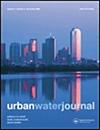The impact of wastewater-irrigated urban agriculture on microbial quality of drinking water at household level in Addis Ababa, Ethiopia
IF 1.6
3区 环境科学与生态学
Q3 WATER RESOURCES
引用次数: 0
Abstract
ABSTRACT Wastewater irrigation may reintroduce fecal pathogens to households and cause drinking water contamination. The aim of this study was to assess the effect of wastewater irrigation on the quality of drinking water among wastewater-irrigating urban farming households. Drinking water samples from 52 households of farming communities in 19 sampling sites were collected twice at PoS and PoC. The microbial quality of the water was assessed using E. coli counted by membrane filtration. Samples collected from exposed households at PoC were 100% positive for E. coli with mean E. coli at PoC increased 10× from the PoS and 3× higher compared to PoC in the unexposed households. The absence of hand washing water (ATE = 8.14), water storing (ATE = 7.75) and intermittent water supply (ATE = 6.25) were significant factors for the increased E. coli at PoC. Breaking the path of the pathogens from the farm to the house and from PoS to PoC needsintervention.埃塞俄比亚亚的斯亚贝巴城市农业废水灌溉对家庭饮用水微生物质量的影响
摘要废水灌溉可能会将粪便病原体重新引入家庭,并导致饮用水污染。本研究的目的是评估废水灌溉对城市农户饮用水质量的影响。在PoS和PoC,对19个采样点的52户农业社区的饮用水样本进行了两次采集。使用通过膜过滤计数的大肠杆菌来评估水的微生物质量。从接触PoC的家庭收集的样本中,大肠杆菌100%呈阳性,PoC的平均大肠杆菌比PoS增加了10倍,比未接触PoC家庭的PoC增加了3倍。没有洗手水(ATE = 8.14),储水(ATE = 7.75)和间歇供水(ATE = 6.25)是PoC时大肠杆菌增加的重要因素。打破病原体从农场到家庭以及从PoS到PoC的路径需要干预。
本文章由计算机程序翻译,如有差异,请以英文原文为准。
求助全文
约1分钟内获得全文
求助全文
来源期刊

Urban Water Journal
WATER RESOURCES-
CiteScore
4.40
自引率
11.10%
发文量
101
审稿时长
3 months
期刊介绍:
Urban Water Journal provides a forum for the research and professional communities dealing with water systems in the urban environment, directly contributing to the furtherance of sustainable development. Particular emphasis is placed on the analysis of interrelationships and interactions between the individual water systems, urban water bodies and the wider environment. The Journal encourages the adoption of an integrated approach, and system''s thinking to solve the numerous problems associated with sustainable urban water management.
Urban Water Journal focuses on the water-related infrastructure in the city: namely potable water supply, treatment and distribution; wastewater collection, treatment and management, and environmental return; storm drainage and urban flood management. Specific topics of interest include:
network design, optimisation, management, operation and rehabilitation;
novel treatment processes for water and wastewater, resource recovery, treatment plant design and optimisation as well as treatment plants as part of the integrated urban water system;
demand management and water efficiency, water recycling and source control;
stormwater management, urban flood risk quantification and management;
monitoring, utilisation and management of urban water bodies including groundwater;
water-sensitive planning and design (including analysis of interactions of the urban water cycle with city planning and green infrastructure);
resilience of the urban water system, long term scenarios to manage uncertainty, system stress testing;
data needs, smart metering and sensors, advanced data analytics for knowledge discovery, quantification and management of uncertainty, smart technologies for urban water systems;
decision-support and informatic tools;...
 求助内容:
求助内容: 应助结果提醒方式:
应助结果提醒方式:


